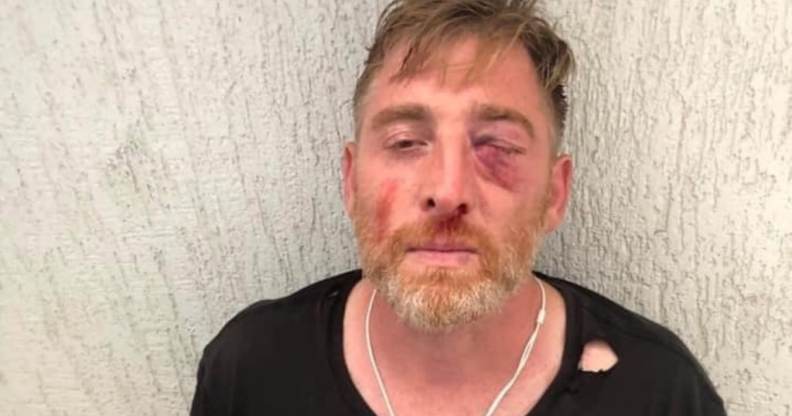Georgian cameraman dies after being brutally beaten by ‘merciless’ anti-Pride mob

Alexander (Lekso) Lashkarava died after he covered the violent protests at Tbilisi Pride. (Twitter)
A Georgian cameraman has died after he was violently beaten by a mob while covering anti-Pride protests in Tbilisi last week.
Alexander (Lekso) Lashkarava’s body was discovered at his home by his mother on Sunday morning (11 July), just six days after Tbilisi Pride was cancelled as far-right thugs unleashed a wave of violence on the city.
Lashkarava, a TV Pirveli cameraman, sustained broken bones in his face and a concussion after the mob broke into the offices of the Shame Movement in Tbilisi on Monday (5 July), where he was working with journalist Miranda Bagharturia.
Reflecting on the attack, Bagharturia said she and Lashkarava were cornered by a mob while covering the outbreak of violence. A priest allegedly grabbed her by the hair and she was hit, after which Lashkarava intervened.
When Lashkarava told the men to stop beating Bagharturia, they turned on him. The mob proceeded to beat him “mercilessly” for 20 minutes, Baghaturia said, leaving him in “a pool of blood”.
“Meanwhile, 15 people were holding me, I was yelling at them not to kill him, they were prodding and hitting me,” Bagharturia said.
Lashkarava was subsequently treated in hospital for his injuries and he was discharged on Friday (9 July). The cause of death has not yet been revealed.
Activists have called on Georgia’s government to resign
There was shock and outrage in Georgia on Sunday as news broke that Lashkarava had died. TV Pirveli owner Vato Tsereteli hit out at the country’s government, suggesting prime minister Irakli Gharibashvili was “personally responsible” after he blamed the outbreak of violence on the LGBT+ community.
Five people have been arrested in connection with the attack, however TV Pirveli said it had managed to identify nine of the assailants from video footage.
Thousands of people gathered outside Georgia’s parliament on Sunday evening (11 July) to call for Gharibashvili’s resignation. In a furious speech, TV Pirveli anchor Eka Mishveladze said Georgia has “no future at the hands of this government”.
❗️Horrific news from #Georgia. Camera-man beaten by church-led far-rights on July 5, dies today!
⚡️ I spent hours with this guy at @Shamemovement office before radicals stormed it. When most of our team managed to leave, he stayed to work. He dies few days after the beating. pic.twitter.com/bQMLMCfe8d
— Tamaz Sozashvili (@TamazSozashvili) July 11, 2021
“We will not cover anything you do,” Mishveladze warned the government. “Your lies must finish. We will show you the power of media.”
The Shame Movement, a freedom fighter activist organisation, has given the Georgian prime minister and government until 12pm on Monday to resign.
“If they do not comply, we will inform you of our action plan, which will lead to the removal of Gharibashvili and his government,” the group wrote on Twitter on Sunday.
A group of 19 civil rights organisations released a joint statement on Sunday calling for Gharibashvili to resign following Lashkarava’s death.
“Lekso Lashkarava was one of more than 50 media professionals targeted by hate groups during the large-scale and violent protests on 5 July,” the joint statement said.
“The political responsibility for the severe consequences lies with the government, which has in fact refused to perform its function to protect human health and life,” they added.
Georgia’s president calls for full investigation following Alexander Lashkarava’s death
Salome Zourabichvili, president of Georgia, said she had visited Lashkarava’s family on Sunday, adding that his death was “a tragedy”.
“I send my condolences to the entire media community and to all of Georgia,” she wrote on Twitter.
“It must be investigated and those responsible must be punished.”
The Ministry of Internal Affairs said on Monday that it was carrying out “investigative-operative measures” to identify others responsible for the attack.
There was widespread shock last Monday (5 July) when Tbilisi Pride was called off as far-right protests spiralled out of control. The group’s office was destroyed by a furious mob while countless others were injured.
Frustrations reached a fever pitch when Garibashvili said it was “unreasonable” of Tbilisi Pride to stage a march in the first place.
“Holding of the so-called Pride march is not reasonable as it creates a threat of civil confrontation,” he said, adding that such events are “unacceptable for a large segment of the Georgian society”.

